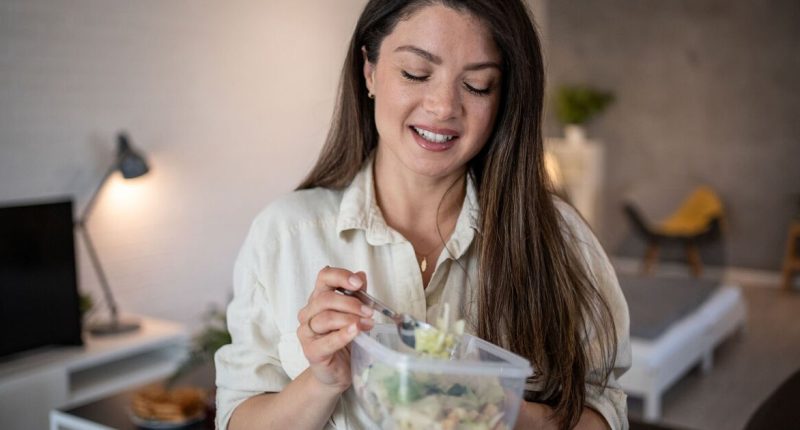Share this @internewscast.com

Chemicals released from plastic containers are at low levels (Image: Getty)
Quack cures have a long and colourful history — from garlic necklaces worn during the 1918 flu pandemic to copper bangles that promise relief from arthritis. If an illness exists, so does a snake oil salesman willing to sell you the latest lotion, tincture or balm to fix it. Despite this being a well-known problem, vulnerable patients are still being taken in and even dying after turning to alternative therapies. At the world’s largest oncology conference this month, experts warned of rising online misinformation fuelling myths about the causes of, and cures for, cancer.
Dr Julie Gralow, chief medical officer at the American Society for Clinical Oncology, which hosted the Chicago conference, said she had seen patients turn to clinics in Mexico which promise “an all-natural treatment for cancer, which includes caffeine colonics, vitamin C infusions and other things”. Some realise the error of their ways and return a few months later, she said. However, “a few times, they didn’t come back, and then I would learn within nine months they tragically had died in some cases”.
Don’t miss… Urgent recall issued for popular sweet over ‘cancer risk’ [LATEST]

Cancer patients are exposed to more misinformation online than ever before (Image: Getty)
The discussion prompted a stark warning from England’s top doctor, NHS medical director Professor Sir Stephen Powis, who urged patients not to be taken in by “miracle cures” and “fairy tales”.
With dodgy cancer advice more readily available than ever, we’ve recruited three experts to create an antidote to the misinformation. Here are 12 common cancer myths, busted:
CAUSES
1. Sugar
The best medical myths contain a grain of truth. The idea that sugar “feeds” cancer is based on the fact that cancer cells require glucose, a type of sugar, for energy. Glucose is also the basic fuel that powers every one of our cells. Richard Simcock, Macmillan Cancer Support’s chief medical officer, says: “Whether sugar causes cancer is probably one of the top ten questions I get asked. The answer is, definitely not.
“Your body needs sugar in different forms so you cannot stop sugar going selectively to cancers. We know that obesity is a risk factor, so would advise cutting down on sugar to be healthy, but eliminating sugar from your diet altogether is not going to stop you from getting cancer.”
2. Artificial sweeteners
The International Agency for Research on Cancer has classified aspartame, a sweetener commonly used in diet fizzy drinks, as “possibly carcinogenic to humans”. However, this only means there is limited evidence of a potential link.
Maxine Lenza, health information manager at Cancer Research UK, says: “There is no convincing evidence that artificial sweeteners such as aspartame cause cancer in humans, and people shouldn’t be worried about getting cancer from food and drink containing them.
“Your overall diet is more important than individual foods or ingredients for reducing cancer risk.” She advises aiming for a balanced diet with lots of fruit, veg and wholegrains, and lower in processed and red meats and foods that are high in fat, sugar and salt.
3. Underwire bras
As if choosing the right bra was not complicated enough, in the late 90s a myth spread that underwire bras increase breast cancer risk. The wire could restrict the flow of lymphatic fluid, part of the body’s drainage system, causing a build up of toxins, it was said.
Dr Liz O’Riordan is a retired breast cancer surgeon who has been diagnosed with the disease three times, including two recurrences, and uses her social media presence to combat misinformation. Her verdict on the bra rumour? “None of this is true. Underwires don’t stop lymph drainage. Lymph fluid doesn’t contain toxins and toxins don’t cause breast cancer.”
Don’t miss… Major report finds 48% surge in chances of having cancer in UK [LATEST]
4. Microwaving food in plastic containers
Amid rising concern about the health effects of microplastics, it is unsurprising that they feature in this list. It has been claimed that heating food in plastic containers can release carcinogenic chemicals.
Before you launch your Tupperware into the bin, here’s Ms Lenza’s advice: “Despite some common misbeliefs, microwaves do not make your food radioactive and any chemicals that get into food and drink from plastic containers are at low levels and won’t cause cancer. It is safe to consume food and drinks stored in plastic and use ‘microwave safe’ containers to heat up your food in the microwave.”
5. Negative emotions
It is true that mental health issues or chronic stress can make it harder for people to keep up with healthy habits that lower cancer risk, but there is no conclusive evidence that negative emotions directly cause it.
Dr O’Riordan explains: “One of the founding beliefs of functional medicine is that toxic thoughts are a ‘root cause’ of cancer, and you have to address your issues before you can be cured.
“Negative emotions are meant to deplete the body of nourishment. While severe stress can lead us to live a less healthy lifestyle — which can increase the risk of cancer, sadness or depression by themselves do not. There is no evidence that high stress levels or negative thoughts increase your risk of cancer.”
6. Deodorants and antiperspirants
The myth that using deodorants cause cancer is something people have worried about “for a long time, and we are able to say it does not”, Mr Simcock says.
“You put deodorant close to breast tissue, so it’s understandable why people might think that. But scientific trials have not shown there is any connection between the deodorant you use and cancer.
“We see breast cancer in people who have never used deodorant, we see breast cancer in people who use all different types of deodorant and several reviews of studies have confirmed no evidence of harm from deodorants.”
CURES
1. Juice cleanses and raw food diets
Some wellness fanatics claim that eating only raw foods or following restrictive juice diets can beat the disease. Juices can be a good source of nutrients, but the reality is that starving yourself does not starve the cancer selectively, and it can trigger serious health consequences such as fatigue, muscle loss or malnutrition.
Cancer Research UK warns that it can be particularly harmful to deprive yourself of protein, carbohydrates and fats, which your body needs to repair itself.
2. Keto diet
A ketogenic diet is a low-carbohydrate, high-fat diet that aims to induce a metabolic state called ketosis. In ketosis, the body primarily burns fat for fuel instead of carbohydrates.
Dr O’Riordan says claims about the Keto diet curing cancer “stem from a theory that cancer is caused by damaged mitochondria that use more glucose for energy”.
She adds: “Damaged mitochondria are not the cause of cancer. Every cell uses glucose (or sugar) for energy, so people on the diet are starving their whole body, including their heart and lungs. When you cut carbs, the body uses fat and protein for energy instead. And this restrictive diet can actually increase your risk of dying from cancer through malnutrition.”
3. Ivermectin
Antiparasitic drug ivermectin has proved popular with peddlers of medical misinformation. During the pandemic, dodgy doctors and social media warriors claimed it could treat Covid. An Oxford University study published last year found no clinically meaningful benefits.
In January, Hollywood actor Mel Gibson claimed on the Joe Rogan Experience podcast (which has a history of promoting dubious health advice) that three of his friends had overcome stage four cancer after taking ivermectin and another anti-parasitic drug, fenbendazole. After a clip went viral, medical leaders including the Canadian Cancer Society spoke out to warn patients the treatments were “not scientifically proven”.
4. CBD
Cannabidiol is a non-psychoactive compound found in the cannabis plant. It is often touted as a potential cure for various medical ailments. When it comes to cancer, Ms Lenza says: “We don’t have convincing evidence that cannabis or the chemicals within it, such as CBD oil, can treat cancer.
“More research involving people with cancer in clinical trials would be needed to determine if these drugs can be used in treatment. It’s important that cancer patients treat any information promoting unconventional treatments with caution, and talk to their doctor or cancer team before considering new therapies.”
5. Baking soda
Another quack claim based on dodgy science is that baking soda can treat or cure cancer. The theories behind this include the myth that cancer is a fungus, or that making the body more alkaline can help defeat it.
According to Cancer Research UK, it’s true that cancer cells cannot live in a very alkaline environment, but neither can any other cells in our body. High doses of sodium bicarbonate are poisonous and can cause symptoms including diarrhoea, vomiting, dehydration, seizures and kidney failure.
6. Black salve
Another staple of snake oil salesmen, black salve is a herbal paste that causes the skin to burn and scab. Also known as Cansema or bloodroot, it has been claimed to treat skin cancer or tumours that are close to the surface of the skin. Proponents say the salve draws the cancer out but there is no medical evidence to support this.
Macmillan’s web page on alternative therapies warns of serious side effects: “When the scab falls off, there can be permanent damage to the skin and tissue beneath. Some people using it have been permanently disfigured. It can also leave behind an open wound which is prone to infection.”
How to find accurate advice
When reading about cancer online, you should always look for trusted sources and advice that draws on the best medical evidence.
Ms Lenza says: “Check the information with reliable credible sources to understand what’s proven and what’s not, so you can take charge of your health.”
Charities Cancer Research UK and Macmillan Cancer Support offer a wealth of accurate advice on their websites. Both carry the PIF Tick, awarded by the Patient Information Forum to organisations who pass yearly assessments for providing trustworthy health information.
The check ensures that information meets a number of criteria including that it is evidence-based, up-to-date and easy to use.
Mr Simcock urged anyone with questions about cancer to contact Macmillan. He added: “You can call the free support line on 0808 808 00 00, open everyday 8am to 8pm or visit the website www.macmillan.org.uk”











